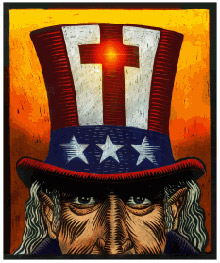 |
 |
 |
 Editorials | April 2005 Editorials | April 2005  
Politics in Red Robes
 Sidney Blumenthal - The Guardian UK Sidney Blumenthal - The Guardian UK


| | Bush's attendance at the Pope's funeral merely masks White House exploitation of Catholic division. |
President Bush, a militant evangelical Protestant, has lowered the American flag to half-staff for the first time at the death of a pope. Also for the first time, a US president will attend a papal funeral. Bush's political rhetoric is deliberately inflected with Catholic theological phrases, in particular "the culture of life", words he used to justify his interference in the case of Terri Schiavo, the brain-damaged woman, the removal of whose feeding tube was upheld 19 times by state and federal courts.

In the 2004 election, Bush's campaign helped organise the attack on John Kerry's Catholic authenticity by conservative bishops who threatened to deny him communion. Inside the White House, policy and personnel are coordinated in line with rightwing Catholicism. Not only are issues like international population control, reproductive health and women's rights vetted, but so are appointments.

Since the accession of Pope John Paul II, the conservative mobilisation within the American church has been a microcosmic version of the ascendancy of the conservative movement in the country generally. As the authority of the Vatican was marshalled on behalf of the conservatives, the Republican right adopted its position as its own in order to capture Catholic votes. Now the social agendas of conservative Catholics and Republicans are indistinguishable.

John Paul II welcomed American democracy as a counter to communism, but he had no experience with democracy of any kind. He envisioned his mission as restoring the authority of the church. America appeared to him as a liberal inferno - its citizens, he lectured American bishops last year, were "hypnotised by materialism, teetering before a soulless vision of the world".

The Pope asserted his control over the American church in 1984 with his naming of conservatives Bernard Law and John O'Connor as archbishops of Boston and New York. They became his chief agents. At the same time, the Vatican refused to deal with the elected officers of the US conference of Catholic bishops, who were largely imbued with the spirit of Vatican II.

Cardinal Joseph Bernardin of Chicago was acknowledged as the leader of the bishops and represented the broad progressive tradition of the American church. He articulated the concept of Catholicism as a "seamless garment" in which abortion was only one among many important issues. In 1994 he announced a common ground initiative, entitled Church in a Time of Peril, calling on the church to overcome its polarisation and suppression of discussion on the issues tearing it apart - from women's changing roles to the fact that many Catholics did not accept most church teachings on sexuality to the declining numbers of priests. Bernardin was a consensus builder and believed he had touched all bases with the Vatican before unveiling his project. But the same day, Cardinal Law, clearly acting with Vatican authority, denounced it: "The fundamental flaw in this document is its appeal for 'dialogue' as a path to 'common ground'. "

Bernardin died months later and was replaced by a protégé of Law's. In 2002, the Boston Globe ran the first of more than 250 stories on paedophilic molestation by parish priests. Law resisted investigating the sex scandal and faced potential criminal prosecution for his cover-ups. The Pope rescued him with a sinecure in the Vatican. In the aftermath of the sex scandal, conservatives under siege lashed out more ferociously. As they saw it, their failure to overturn the law on abortion demonstrated that they had not been hardline enough. Thus the sex scandal set the stage for the rightwing Catholic offensive on behalf of Bush in the 2004 campaign.

With the Pope's death, American Catholics yearn for openness. According to a poll by Gallup, 78% want the next pope to allow Catholics to use birth control; 63% say he should let priests marry; 59% believe he should have a less strict policy on stem cell research; 55% say he should allow women to be priests.

But the Republicans are moving aggressively on the conservative social agenda. This week, in Kansas, gay marriage was banned in a referendum. Four states have passed bills permitting pharmacists to refuse to fill prescriptions for contraceptives. The governor of Illinois has issued an emergency order to ensure that pharmacists fill all prescriptions. California's legislature is debating a law to require druggists to do the same.

By consolidating power, the Pope believed that he was strengthening the church. Now the conservatives want a post-John Paul papacy to extend his stringency. Others want moderation, openness and discussion. Catholics in America do not now hold the same principle of hope. No one monitors the church's crisis more closely than the White House, and no one plots to exploit its division more ruthlessly. Religion is politics under red robes. So Bush travels to Rome.

Sidney Blumenthal is former senior adviser to President Clinton and author of The Clinton Wars. | 
 | |
 |



